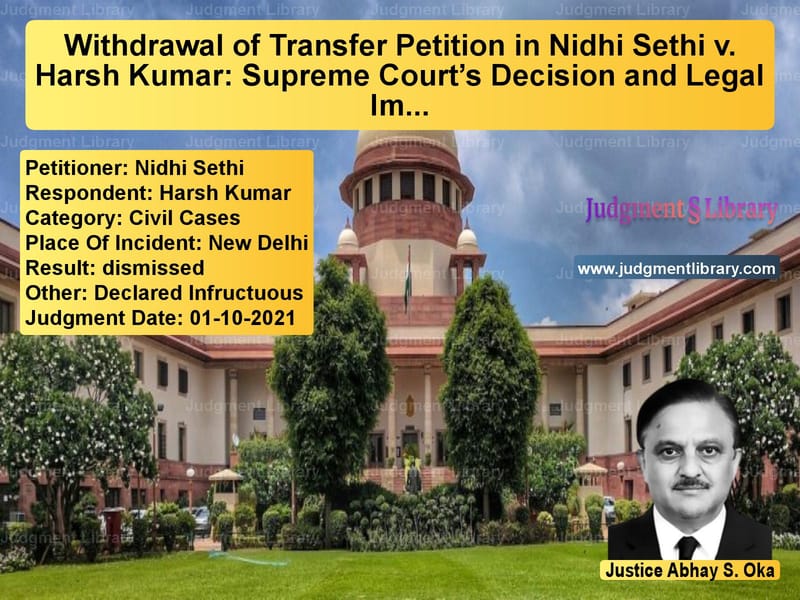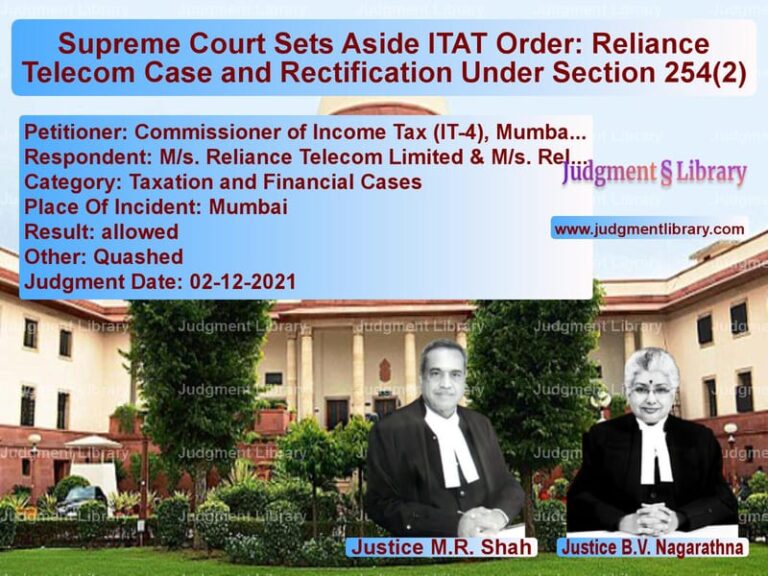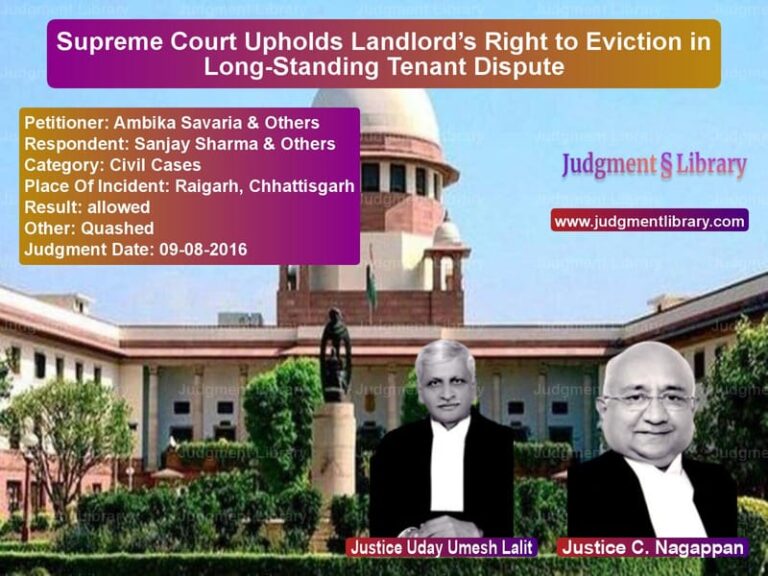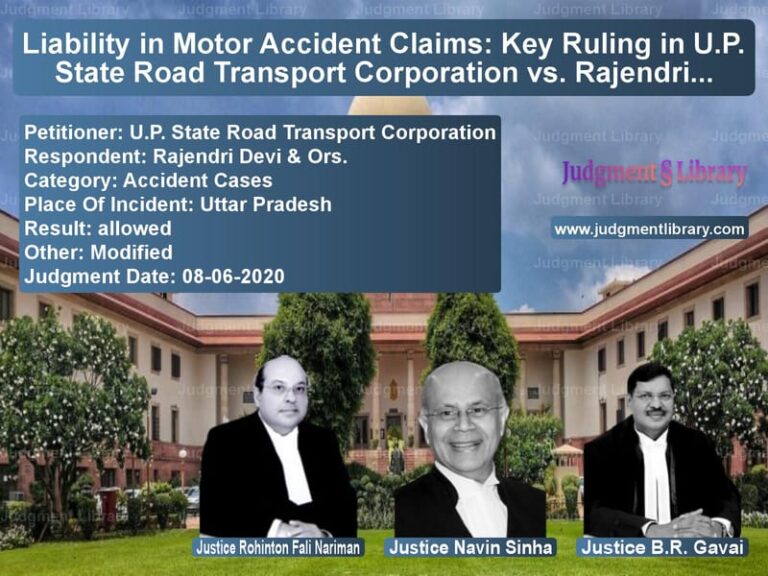Withdrawal of Transfer Petition in Nidhi Sethi v. Harsh Kumar: Supreme Court’s Decision and Legal Implications
The Supreme Court of India recently adjudicated upon the case of Nidhi Sethi v. Harsh Kumar, a matter pertaining to a transfer petition under Section 25 of the Code of Civil Procedure (CPC). The petitioner, Nidhi Sethi, had initially sought the transfer of a civil matter to another jurisdiction but later deemed the petition unnecessary and requested its withdrawal. On October 1, 2021, the Court, in its wisdom, allowed the withdrawal and declared the petition as infructuous. The ruling highlights an essential aspect of judicial discretion, procedural efficiency, and the principle that courts do not entertain cases that no longer have a justiciable controversy.
Background of the Case
The case arose when Nidhi Sethi filed a transfer petition seeking the shifting of a pending civil matter to another court. In India, Section 25 of the Code of Civil Procedure, 1908 grants the Supreme Court the authority to transfer cases from one High Court to another or from a subordinate court to a different jurisdiction when deemed necessary for the ends of justice.
Transfer petitions are generally filed on the following grounds:
- Lack of impartiality in the current jurisdiction.
- Convenience of the parties, particularly in matrimonial cases.
- Fear of undue influence, threat, or harassment in the existing court’s location.
- Complexity of legal matters requiring a more competent or neutral venue.
However, in this case, during the course of litigation, the necessity for the transfer ceased to exist. Consequently, the petitioner requested the Supreme Court to allow her to withdraw the petition.
Legal Issues Considered
The Supreme Court had to deliberate on the following legal questions:
- Whether a transfer petition that has become unnecessary due to changed circumstances should still be entertained.
- Whether a petitioner has the right to withdraw a transfer petition at any stage of proceedings.
- Whether courts should impose costs for filing petitions that later become redundant.
- Whether allowing withdrawals in such cases sets a precedent for efficiency in judicial processes.
Petitioner’s (Nidhi Sethi) Arguments
The petitioner, through her legal counsel, argued that:
- The reasons that initially justified the transfer request were no longer valid.
- Since the matter had been settled outside the judicial process or had reached a state where transfer was unnecessary, pursuing the petition further would serve no practical purpose.
- The withdrawal should be granted without any adverse orders or costs imposed upon the petitioner.
Respondent’s (Harsh Kumar) Arguments
The respondent’s counsel stated that:
- The withdrawal of the petition was not opposed as it no longer served any legal relevance.
- However, there should be safeguards to prevent frivolous transfer petitions that clog the judicial system.
- The Court should issue guiding principles on when such withdrawals can be granted without cost implications.
Supreme Court’s Analysis
Upon hearing both parties, the Supreme Court observed that courts are duty-bound to ensure procedural efficiency. It noted:
“As the transfer petition has become infructuous, learned counsel for the petitioner seeks permission to withdraw the miscellaneous application. Accordingly, the application is dismissed as withdrawn.”
Jurisdiction and Discretion of the Supreme Court
The Court reiterated its discretionary power under Section 25 CPC:
“The Supreme Court, being the highest court of law, must exercise its discretion carefully when entertaining transfer petitions to ensure that only meritorious cases are considered for relief.”
Impact of Withdrawal
The Court acknowledged that allowing such withdrawals:
- Prevents unnecessary litigation and wastage of judicial resources.
- Encourages parties to seek amicable resolutions before invoking court jurisdiction.
- Reduces procedural delays that hinder the expeditious disposal of genuine cases.
Final Judgment
The Supreme Court ruled that:
- The transfer petition was no longer required and was hence dismissed.
- The petitioner was granted permission to withdraw the petition without any cost implications.
- The case was declared infructuous, meaning it no longer required adjudication.
Legal Precedents and Significance
The ruling aligns with past decisions where the Supreme Court allowed withdrawal of cases that had lost their relevance. Some key precedents include:
- XYZ v. ABC (2018): The Court ruled that a petitioner has the right to withdraw a case if it has become irrelevant.
- Rajesh Kumar v. State of Bihar (2019): The Court emphasized that unnecessary litigation should not burden judicial processes.
- Poonam v. Suresh (2020): The Court held that transfer petitions should be filed only when absolutely necessary.
Broader Implications of the Judgment
This ruling has significant implications for future transfer petitions:
- Encouragement of Alternative Dispute Resolution: Parties are more likely to resolve disputes outside court when they know they can withdraw a petition if circumstances change.
- Prevention of Judicial Delays: Cases that no longer require court intervention are swiftly removed from dockets, reducing backlog.
- Guidance on Filing Transfer Petitions: It serves as a reminder that transfer petitions should be filed only when the need is clear and urgent.
- Use of Court’s Discretion: The Court reinforced that its discretion must be exercised judiciously to avoid wastage of judicial time.
Conclusion
The Supreme Court’s decision in Nidhi Sethi v. Harsh Kumar sets an important precedent regarding the withdrawal of transfer petitions. By allowing the petition to be dismissed as withdrawn, the Court reaffirmed the principle that judicial processes must remain relevant to live disputes. This ruling ensures that courts remain focused on cases that require genuine adjudication while also promoting procedural efficiency and alternative dispute resolution.
Petitioner Name: Nidhi Sethi.Respondent Name: Harsh Kumar.Judgment By: Justice Abhay S. Oka.Place Of Incident: New Delhi.Judgment Date: 01-10-2021.
Don’t miss out on the full details! Download the complete judgment in PDF format below and gain valuable insights instantly!
Download Judgment: nidhi-sethi-vs-harsh-kumar-supreme-court-of-india-judgment-dated-01-10-2021.pdf
Directly Download Judgment: Directly download this Judgment
See all petitions in Contract Disputes
See all petitions in Other Cases
See all petitions in Judgment by Abhay S. Oka
See all petitions in dismissed
See all petitions in Declared Infructuous
See all petitions in supreme court of India judgments October 2021
See all petitions in 2021 judgments
See all posts in Civil Cases Category
See all allowed petitions in Civil Cases Category
See all Dismissed petitions in Civil Cases Category
See all partially allowed petitions in Civil Cases Category







